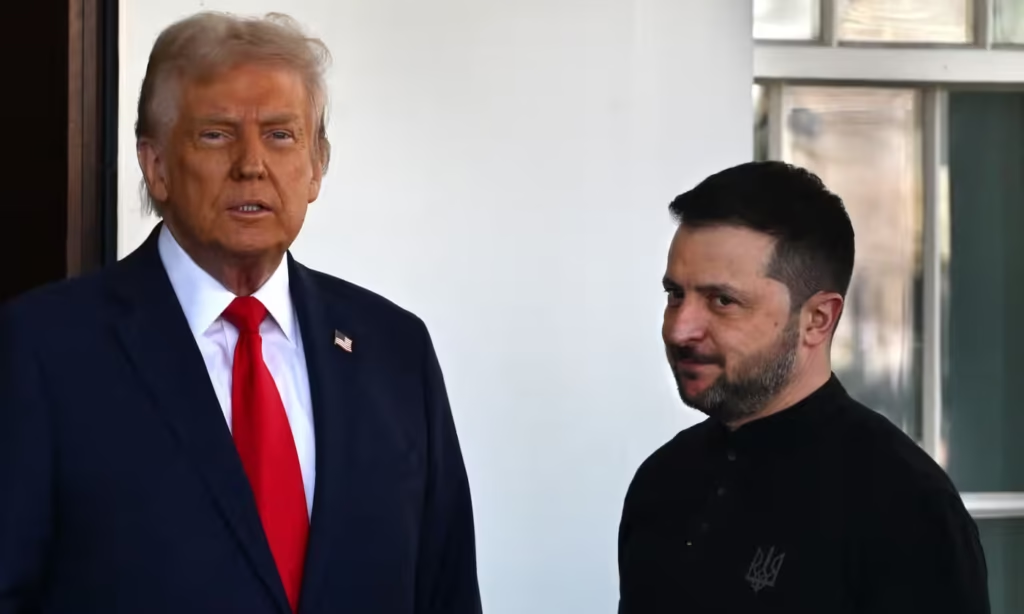In yet another moment of political spectacle, former U.S. President Donald Trump has once again demonstrated his inability to engage in serious international negotiations. Ukrainian President Volodymyr Zelensky’s recent actions and statements have effectively exposed Trump’s lack of knowledge, diplomatic skill, and overall competence in handling global affairs. The event, which has now gained widespread media attention, raises serious concerns about Trump’s potential role in future international discussions should he return to power.
To understand the significance of this recent incident, it is crucial to revisit Trump’s history of mishandling international relations. Throughout his presidency from 2017 to 2021, Trump showed a pattern of undermining allies, cozying up to authoritarian leaders, and demonstrating a lack of understanding of global dynamics.
- NATO Blunders: Trump repeatedly called NATO “obsolete” and even suggested that the U.S. might not defend member countries if they failed to meet defense spending targets. This stance deeply unsettled European allies and weakened trust in American commitments.
- Ukraine Scandal: Trump’s first impeachment stemmed from his attempt to pressure Zelensky into announcing an investigation into Joe Biden in exchange for military aid, a move widely condemned as an abuse of power.
- North Korea Fiasco: His negotiations with Kim Jong-un, despite multiple high-profile meetings, yielded no concrete results, and North Korea continued its weapons development.
- Alienation of Allies: His America-first approach led to strained relations with traditional allies like Germany, Canada, and France, often due to his erratic behavior and threats of trade wars.
Given this track record, the recent event with Zelensky serves as yet another confirmation that Trump remains unfit for serious diplomatic engagement.

Zelensky, a leader who has been thrust into global prominence due to Russia’s invasion of Ukraine, has demonstrated remarkable diplomatic skill in rallying international support for his country. He has successfully navigated negotiations with the U.S., the EU, and other global powers to secure military aid and sanctions against Russia.
Trump, however, has frequently downplayed the importance of aiding Ukraine, even suggesting that he could end the war “within 24 hours” without offering any credible plan. His vague, unrealistic assertions have led many to question whether he understands the complexities of the war or international diplomacy at all.
Recently, in a public setting, Trump made statements dismissing Ukraine’s plight and downplaying the significance of Russia’s aggression. Zelensky, in response, offered a sharp, well-articulated rebuttal that highlighted Trump’s ignorance.
- Clear Facts vs. Baseless Claims: Zelensky countered Trump’s claims by emphasizing the reality of the situation on the ground. He detailed the war crimes committed by Russia, the necessity of continued Western aid, and how Trump’s proposed approach was naive at best and dangerous at worst.
- Exposing Trump’s Contradictions: Zelensky pointed out the inconsistency in Trump’s past actions—how he withheld military aid from Ukraine while now claiming to be a supporter of peace.
- Calling for Real Leadership: Rather than engaging in political showmanship, Zelensky challenged leaders, including Trump, to offer real solutions instead of empty promises.
By taking a firm stance, Zelensky effectively showcased Trump’s inability to engage in serious negotiations. The contrast between the two leaders was stark—one presented well-reasoned arguments, while the other relied on bravado and misinformation.
The implications of Trump’s diplomatic failures extend far beyond a single embarrassing moment. If Trump were to return to office, his approach to foreign policy could have devastating consequences:
- Weakening Global Alliances: His hostility toward NATO and traditional allies could erode decades of trust and cooperation, potentially leaving the U.S. isolated on the global stage.
- Empowering Autocrats: His admiration for leaders like Vladimir Putin and Kim Jong-un could embolden authoritarian regimes and weaken global efforts to promote democracy.
- Destabilizing Conflict Zones: A return to Trump-style diplomacy—characterized by erratic decision-making and impulsive actions—could lead to more instability in regions like Ukraine, the Middle East, and Asia.
Following Zelensky’s pointed remarks, many political figures and analysts weighed in on Trump’s inadequacies:
- U.S. Politicians: Democratic leaders reiterated their warnings about Trump’s unfitness for office, while some Republicans distanced themselves from his comments, concerned about alienating voters who support Ukraine.
- International Response: European leaders expressed concern over Trump’s potential return to power, worried that he would undermine efforts to maintain global stability.
- Media Coverage: Major news outlets highlighted the exchange as yet another example of Trump’s diplomatic shortcomings, with many comparing his approach unfavorably to Zelensky’s leadership.


